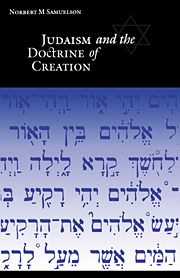Book contents
- Frontmatter
- Contents
- Preface
- Introduction
- PART 1 THE MODERN DOGMA OF CREATION
- PART 2 A JEWISH VIEW OF CREATION
- PART 3 THE FOUNDATIONS FOR THE JEWISH VIEW OF CREATION
- PART 4 A BELIEVABLE VIEW OF CREATION
- Chapter 7 Creation from the perspective of contemporary physics
- Chapter 8 Creation from the perspective of contemporary philosophy
- Notes
- Select bibliography
- Indices
Chapter 8 - Creation from the perspective of contemporary philosophy
Published online by Cambridge University Press: 08 January 2010
- Frontmatter
- Contents
- Preface
- Introduction
- PART 1 THE MODERN DOGMA OF CREATION
- PART 2 A JEWISH VIEW OF CREATION
- PART 3 THE FOUNDATIONS FOR THE JEWISH VIEW OF CREATION
- PART 4 A BELIEVABLE VIEW OF CREATION
- Chapter 7 Creation from the perspective of contemporary physics
- Chapter 8 Creation from the perspective of contemporary philosophy
- Notes
- Select bibliography
- Indices
Summary
Our study of the doctrine of creation as it arises out of the textual sources of Judaism is now complete. We began by explicating the doctrine in the single most important text of contemporary Jewish philosophy to deal with creation – Rosenzweig's Star of Redemption. Next we discussed whether or not this view could be called Jewish. The answer was a demonstration that Rosenzweig's concept is coherent with the general discussion of this concept in the relevant classical rabbinic texts – viz., the works of medieval Jewish philosophy and the rabbinic philosophical commentaries on the first chapter of Genesis. Here, rather than presenting a summary of all of the literature that (because of its general character) would lose the richness of the details of each individual religious philosopher and theologian, we chose specific texts upon which to focus as representative of the best of Jewish thought in each period of Jewish intellectual history. This approach led us to examine the creation concepts of Ibn Daud, Gersonides, Rashi, Ibn Ezra, Nachmanides and Sforno. Our conclusion was that Rosenzweig's concept of creation is in fact coherent with the major writings of these central rabbinic voices. Furthermore, their accounts enabled us to spell out in richer detail what Rosenzweig's own words tell us about creation. This study exhibited the dependence of the Jewish concept on the application of a philosophic-scientific schema to render intelligible the words of the Hebrew scriptures, and we discovered that the primary text that traditional Judaism used for this purpose was Plato's Timaeus. That discovery led us to examine how good a fit the cosmology and cosmogony of Timaeus was for reading the narrative of Genesis.
- Type
- Chapter
- Information
- Judaism and the Doctrine of Creation , pp. 241 - 264Publisher: Cambridge University PressPrint publication year: 1994



